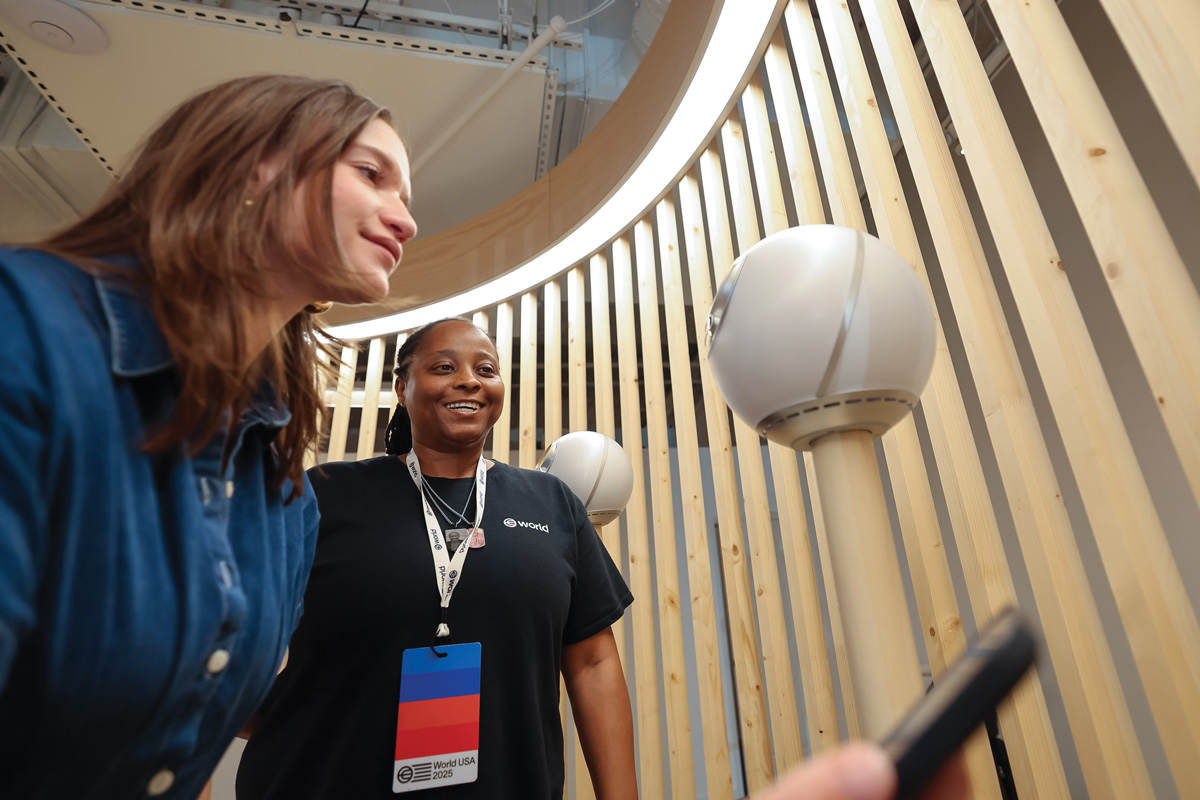
Photograph by Carol Lee Rose / Getty Images for World
A visit to Ponce City Market offers many diversions. You can ride a three-story slide, mull over the magic of crystals, and sample a gummy-flavored sour ale. You can also, as of this May, scan your eyeball and use it to verify your humanity in the dawning age of supersmart robots.
Inside a spare, warehouse-like store wedged between Sweetgreen and City Winery, World invites you to join the 12 million other people globally who have stepped up to the Orb, proffered an eye, and had their iris scanned in exchange for a World ID proving they are human—plus access to a cryptocurrency called WorldCoin.
We are living through a monumental hinge point in history, in which the arrival of artificial intelligence as a dominant force is being measured in single-digit years, if not months. What will it do when it gets here? No one quite knows. (No one quite knows how we’ll know if it’s here, either.) But as the tech industry races to create it, unveiling new generative AI models that can paint, code, or kvetch on social media with evermore humanlike skill, two things have become abundantly clear: We are not prepared for AI’s impact on humans, and we have little idea how to prepare.
Given that predicament, it’s perhaps no surprise that the solutions are coming from the same place as the problem. World App was cocreated by Sam Altman, the Silicon Valley wunderkind (at 40, he’s now more of a wunderguy) behind OpenAI and ChatGPT. Altman and his cofounder, Alex Blania, said they were driven to create World by a desire to build “trust in the age of AI.”
“We wanted a way to make sure that humans stayed special,” Altman told an audience in April, “in a world where the internet was going to have lots of AI-driven content.” Left unsaid, of course, was that Altman—whose net worth is around $1.7 billion—is among those working assiduously to create that world. Why should we trust the Dr. Frankensteins to protect us from their monsters?
When posed with this question at the launch of Atlanta’s World store, Adrian Ludwig, chief information security officer for Tools for Humanity, World’s parent company, smiled. “The tech sector can see the problem,” Ludwig said. “Other people can feel it, but they don’t understand it. I think it’s just a reality that the solution is going to have to come from people who are familiar with it.”
World currently has 27.5 million users, but more than half of those users were onboarded not by the Orb’s human-proofing but by WorldCoin, which is popular abroad in places with volatile currencies, like Kenya and Argentina. (World arrived only recently in the U.S., partly due to the Trump administration’s recent embrace of cryptocurrency.)
The cryptocurrency is something of a gimmick to draw in users while Tools for Humanity figures out what WorldID, its human-verification system, might be used for (and how it might generate revenue). As a user, do you want to prove you are real while trolling your enemies on Facebook? Get the government to employ it to make sure bots aren’t stealing your welfare payments?
The possibilities are endless. All you need to do is proffer your eye.
This article appears in our August 2025 issue.
Advertisement




